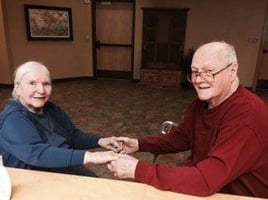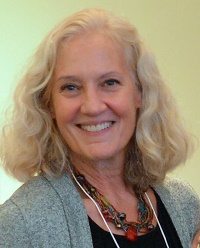 Susan's Parents, Marlin & JoAnn Rechtzigel pictured on the right.
Susan's Parents, Marlin & JoAnn Rechtzigel pictured on the right. As the National Alzheimer’s Disease Awareness Month of June winds to a close and we get ready to celebrate the 4th of July, I realize the irony of these two events. Alzheimer’s is the loss of independence, while the 4th celebrates our nation’s independence with family picnics, neighborhood parades and fireworks.
As my parents both are living in a Memory Care facility due to the disease, we won’t be celebrating the 4th as we have in years past. So I reflect on how their loss of independence has affected my life as their daughter and their power of attorney. A few things have helped me adjust to the role of caregiver these past few years:
1. Friends who understand
Very early in the process of moving my parents off their farm where they lived for over 65 years, my good friend Mary Lou gave me a small book. Creating Moments of Joy for the Person with Alzheimer's or Dementia: A Journal for Caregivers’ short chapters helped me understand and gave me hope.
2. Professionals who know
Unless you have been through this before, Alzheimer’s is confusing and sad. Working with tender professionals who know not only what to do, but understand what I’m going through, is a huge blessing. If you don’t know where to start, check out the Alzheimer’s Association Caregiver Center. They have a great blog and a 24/7 helpline. Also, my parents' physician assured me the onset of the disease in their 80s meant I was not a genetic candidate for Younger/Early Onset Alzheimer's, plus he suggested I read more about the difference between natural memory loss vs. Alzheimer's.
3. Family support
Though an estimated 5.4 million Americans have Alzheimer’s, my parents’ disease made me feel very alone. My sister, who knows how to talk “heath” because she is a Occupational Therapist, lives far away, and my brother, who is close by, had already provided the bulk of care while our parents were still on the farm. Yet I learned to depend on the staff at their Memory Care facility who keeps them active and safe. My sister gave me very wise, grace-filled advice to help me not feel guilty about not visiting every weekend.
4. Community support
With the growth of the disease, “a community and larger family,” a term coined in Mayo Center for Innovation video blog on Pat Summit’s battle, is developing to support not only those with Alzheimer’s, but those who care for them. Many resources are available, including these Caregiving Tip Sheets and Resource Lists from the National Institute on Aging, to assist those caring, advocating, funding, researching and loving those afflicted. Many caregivers find comfort in becoming involved in this community as a way to actively fight what may be personally out of their control.
5. Care for the caregiver
The VITAL WorkLife blog has many resources available to help you with elder care and other family issues. If your company has EAP resources with VITAL WorkLife, you have additional resources available to you, including counseling to help you deal with the added stress, maintain your resilience, enhance your problem solving skills and help you to continue to care for yourself and avoid burnout. You can access resources via your Member Website.
We Can Help
Members can access resources such as in-the-moment telephonic support and/or counseling sessions by calling 800.383.1908 or access resources through the VITAL WorkLife App.


